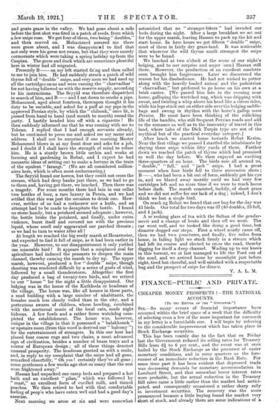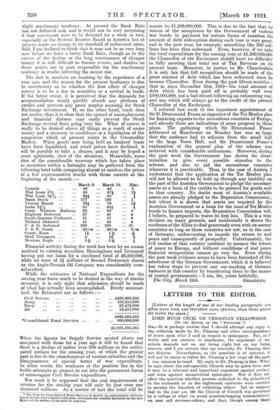FINANCE—PUBLIC AND PRIVATE.
CHEAPER MONEY PROSPECTS ?—THE NATIONAL ACCOUNTS.
[TO THE EDITOR OF TRY " SPECTATOR."] Sin,—So many events of financial importance have occurred within the brief space of a week that the difficulty of selecting even a few of the more important for comment in my letter is a formidable one. I will begin by referring to the considerable improvement which has taken place in Stock Exchange securities. This has been mainly due to the fact that on Friday last the Government reduced its selling rates for Treasury Bills from 61 to 6 per cent., and the event was at once hailed by the Stock Exchange as the precursor of easier monetary conditions, and in some quarters as the fore- runner of an immediate reduction in the Bank Rate. For some time past it has been evident that depressed trade was decreasing demands for monetary accommodation in Lombard Street, and that somewhat lower interest rates were probable, but the actual reduction in the Treasury Bill rates came a little earlier than the market had antici- pated, and consequently occasioned a rather sharp rally in investment securities. The recovery was the more pronounced because a little buying found the market very short of stock, and already there are some indications of a slight reactionary tendency. At present the Bank Rate has not followed suit, and it would not be very surprising if that movement were to be deferred for a week or two, especially as the Federal Reserve Board in America has at present made no change in its standard of rediscount rates. Still, I am inclined to think that it may not be so very long now before we have a lower Bank Rate, though as to the extent of the decline or the long continuance of cheaper money it is still difficult to foresee events, and doubts on those points are in part responsible for the reactionary tendency in stocks following the recent rise.
The fact is, markets are learning by the experience of a year ago, and the reason for the present hesitancy is due to uncertainty as to whether the first effect of cheaper money is to be a rise in securities or a revival in trade. If the latter event, it is perceived that the demands for accommodation would quickly absorb any plethora of credits and prevent any great surplus accruing for Stock Exchange investment. If, on the other hand; trade does not revive, then it is clear that the spread of unemployment and financial distress may easily prevent the Stock Exchange revival from going very far. What of course is really to be desired above all things as a result of easier money and a recovery in confidence is a liquidation of the congestion which at present exists in the Commodity Market. When goods now being held on bankers' loans have been liquidated, and retail prices have declined, it will be possible to take a clearer, and it may be hoped a more optimistic, view of the situation. Meanwhile, some idea of the considerable recovery which has taken place in securities within a fortnight may be gathered from the following brief table comparing almost at random the prices of a few representative stocks with those current at the beginning of the month :-
Consols ..
War Loan 5% ..
War Loan 34% .. ..
Bank Stock ..
March 9.
844 ..
177 .. March 16. 48 874 85 180 ..
..
..
• • Rise.
2 24 3 Victory Bonds .. .. 764 .. 78
India 34% .. 55 .. 554
11 Great Western Railway 63 .. 68 • • 5 Brighton Deferred .. 37 .. 41 • •
4
South-Eastern Preferred.. 51 .. 57 • • 6 Midland Deferred .. 41 .. 45 • • 4
P. & 0. Deferred ..
300 .. 320 • . 20 J. & P. Coats 43/-s. 46/-s. • •
3/-a.
Guest, Keen .. 14 ..
Shell Transport .. 5 ..
51
4 Mexican Eagle .. 5* .. 514
Financial activity during the week has been by no means confined to existing securities, Birmingham and Liverpool having put out loans for a combined total of £6,500,000, while an issue of 3 millions of Second Preference shares by the Anglo-Persian Oil Company was considerably over- subscribed.
While the estimates of National Expenditure for the ,coming year leave much to be desired in the way of drastic economy, it is only right that admission should be made of what has actually been accomplished. Briefly summar- ized, the Estimates are as follows :- Civil Service .. f460,900,585
Army . .. 106,315,000 Navy .. .. 82,479,000 Air • • • • • • .. 18,411,000 £668,105,585 *Consolidated Fund Services .. .. 360,000,000 £1,028,105,585
When the figures for Supply Service quoted above are compared with those for a year ago it will be found that there is a decline of rather over 200 millions in the antici- pated outlays for the coming year, of which the greater part is due to the abandonment of various subsidies and the disappearance of special forms of war expenditure. In other words, the weakness of the position lies in the feeble attempts at present to cut into the permanent forms of extravagant Civil Service expenditure.
Nor must it be supposed that the real requirements of revenue for the commg year will only be just over one thousand millions. As a matter of fact the total will be • The item for Consolidated Fund Services Is merely an approximate estimate based on last year's figures with some allowance for possible inclusion In the new figures of the service of our debt to America. nearer to £1,200,000,000. This is due to the fact that by reason of the acceptance by the Government of various war bonds in payment for certain forms of taxation the amount of debt redemption during each year is very great, and in the past year, for example, something like 200 mil- lions has been thus redeemed. Even, however, if we take the total expenditure for the coming year at £1,200,000,000 the Chancellor of the Exchequer should have no difficulty in fully meeting that total out of Tax Revenue on its present basis. Moreover, in justice to Mr. Chamberlain it is only fair that full recognition should be made of the great amount of debt which has been redeemed since he became Chancellor. Even during the past fifteen months— that is, since December 31st, 1919—the total amount of debt which has been paid off is probably well over £400,000,000, not a bad record following an exhausting war, and one which will always go to the credit of the present Chancellor of the Exchequer. I referred last week to the important appointment of Sir D. Drummond Fraser as organizer of the Ter Meulen plan for financing exports to the necessitous countries of Europe, and already there are indications of some progress in these plans. The gathering which Sir Drummond Fraser addressed at Manchester on Monday last was so large that the audience had to adjourn from the small hall to the large Town Hall, and Sir Drummond Fraser's explanation of the general plan of the scheme was received with considerable enthusiasm. Moreover, during the past week the Government has shown its deter- mination to give every possible stimulus to the scheme, and also to aid the necessitous countries wherever it is practicable. Thus, in the case of Austria I understand that the application of the Ter Meulen plan will not be allowed to be held up through any inability on the part of the Austrian Government to pledge the necessary assets as a basis of the credits to be granted for goods sent to that country. No doubt most of Austria's available assets are already pledged to the Reparation Commission; but where it is shown that assets are required by the Austrian Government as a basis for the issue of Ter Meulen bonds to finance imports, the Reparation Commission will, I believe, be prepared to waive its first lien. This is a wise decision on many grounds, and incidentally it shows the readiness of the Allies to deal generously even with ex-enemy countries so long as those countries are not, as in the case of Germany, endeavouring to impede the return to real peace and consequently of prosperity. Unfortunately, the evil tactics of that country continue to menace the return of peace to Europe, and without conditions of real peace financial recuperation cannot go very far. Even during the past week evidence seems to have been furnished of the adroitness of the German Government, which it is believed has taken steps to prevent any ear-marking of German balances in this country by transferring them to the names of neutral governments.—I am, Sir, yours faithfully,



































 Previous page
Previous page